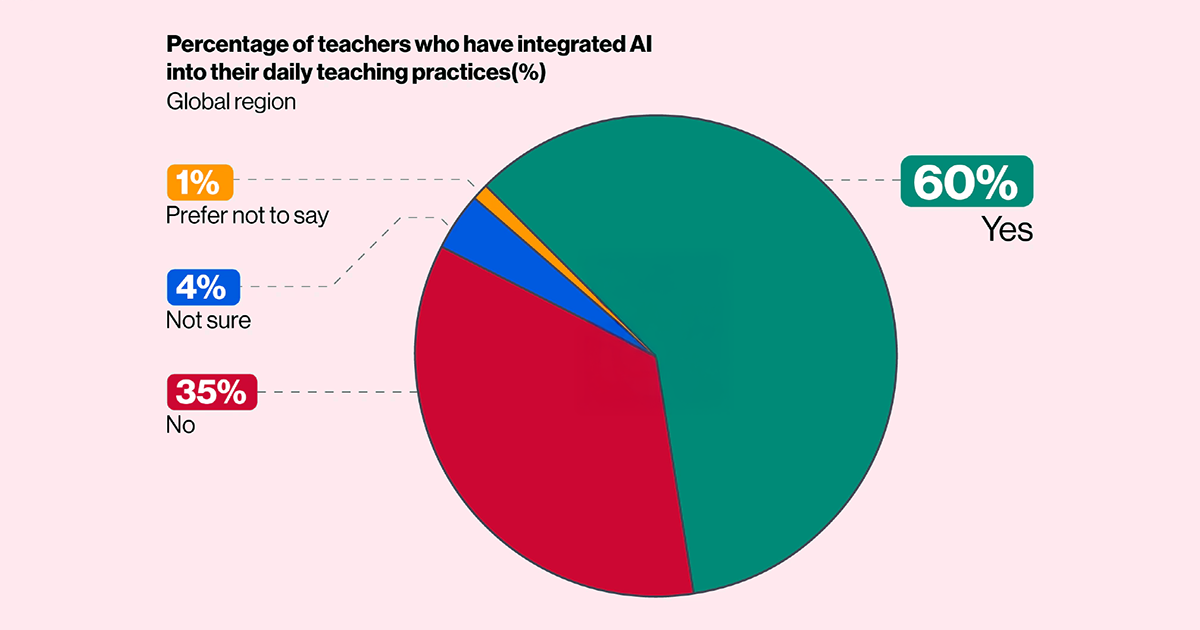Teaching is one of the most demanding professions. Beyond delivering lessons, teachers handle lesson planning, grading, student communication, classroom management, and continuous professional development. With so many responsibilities, educators often find themselves stretched thin, struggling to balance administrative tasks with meaningful student interaction.
At the Education 2.0 Conference, one of the most anticipated education leadership summits in Dubai & USA, we’ve seen firsthand how AI tools are transforming education by making everyday teaching tasks more manageable and efficient. These tools allow teachers to focus more on what matters most—engaging and supporting their students.
Here, we are exploring seven standout AI-powered tools that are helping teachers streamline their workflows and improve classroom outcomes.
1. Planboard By Chalk — Smarter, More Organized Lesson Planning
Lesson planning is foundational but often time-consuming. Teachers need to create engaging lessons aligned with curriculum standards, adapt content for diverse learners, and ensure seamless pacing. During discussions at our global education conference, many educators highlighted the importance of innovative tools to simplify these challenges. Planboard by Chalk meets this need by integrating AI-powered features that assist teachers in organizing their lesson plans efficiently.
Planboard’s drag-and-drop calendar helps schedule lessons, while its curriculum alignment tools suggest standards to meet for each lesson. Additionally, teachers can collaborate with colleagues in real-time, sharing resources and best practices. By automating routine aspects of planning and centralizing materials, Planboard reduces prep time significantly, freeing educators to focus on creative teaching and student interaction.
2. Gradescope — AI-Enhanced Grading That Saves Hours
Grading is notoriously time-intensive, especially for large classes and complex assignments like essays or coding projects. Gradescope leverages AI to automate grading and provide consistent, objective assessments.
Using machine learning, Gradescope can identify patterns in student answers and automatically apply rubrics for objective questions. For open-ended responses, it supports semi-automated grading, where AI suggests scores that teachers can review and adjust. This approach dramatically reduces grading time while maintaining accuracy and fairness.
Moreover, Gradescope provides instant feedback to students, helping them understand mistakes and learn from them promptly. Teachers can spend less time on paperwork and more on individualized support.
3. Kahoot! With AI-Powered Quiz Generation
Experts at our education conference have often pointed out that engagement is key to effective learning. Guess what? Quizzes are a great way to reinforce concepts. However, crafting quizzes can be tedious. Kahoot! now integrates AI to help teachers generate quizzes quickly by analyzing existing lesson materials or input topics.
This AI-driven quiz creation accelerates content development and ensures alignment with learning objectives. It also allows quizzes to adapt in difficulty based on student responses, maintaining challenge without frustration.
Teachers using Kahoot! report higher student motivation and better retention, thanks to the interactive, game-like format coupled with AI’s personalization.
4. Socratic By Google
Many teachers encounter repetitive questions from students struggling with homework. Socratic, an AI-powered app by Google, acts as a virtual tutor to answer questions, explain concepts, and guide problem-solving.
Students simply take a picture of their homework problem or type their question, and Socratic provides step-by-step solutions, relevant resources, and videos tailored to the topic. This reduces the volume of routine queries teachers receive, enabling them to dedicate more time to personalized instruction during class.
Innovations like Socratic are often showcased at events such as our very own education leadership summit, the Education 2.0 Conference. Through these, educators explore new ways to support student learning and improve classroom experiences.
Socratic supports multiple subjects, including math, science, history, and literature, making it a versatile assistant.
5. DreamBox Learning — Adaptive Math Lessons Personalized For Every Student
Differentiation is a challenge in any classroom. DreamBox Learning uses AI to adapt math instruction in real time, adjusting the difficulty and pacing based on student input and performance.
DreamBox continually analyzes how students solve problems, offering hints and alternative approaches tailored to individual learning styles. This dynamic personalization helps close learning gaps quickly and keeps students engaged without overwhelming them.
Teachers benefit by receiving detailed reports highlighting areas where students struggle, allowing targeted interventions. DreamBox essentially acts as a personalized tutor, complementing classroom instruction.
6. Classcraft’s AI Tools For Attendance And Behavior Tracking
Administrative duties like attendance taking and behavior monitoring can interrupt teaching flow and consume valuable time. Classcraft leverages AI to streamline these tasks.
Using facial recognition or QR-code check-ins, Classcraft automates attendance recording accurately and discreetly. Its behavior tracking tools analyze patterns in student conduct through data from classroom management activities, helping teachers identify issues before they escalate.
Automating these processes saves teachers time daily and supports proactive classroom management strategies, leading to a more positive learning environment.
7. Edthena — AI-Driven Video Coaching For Professional Development
Continuous professional growth is critical for teachers aiming to improve their craft. Edthena provides an AI-powered platform where teachers upload videos of their instruction to receive personalized feedback.
The AI analyzes teaching practices, classroom interactions, and student engagement, highlighting strengths and areas for improvement. Edthena also recommends targeted professional learning resources based on individual needs.
Teachers who attend global education conferences like ours often explore innovative tools like Edthena to support ongoing professional development.
This tailored coaching approach allows teachers to focus their development on what truly matters, fitting learning into busy schedules and promoting sustained growth.
Why These AI Tools Matter
Incorporating AI into education isn’t about replacing teachers—it’s about empowering them. By automating repetitive and administrative tasks, these tools allow teachers to reclaim time and energy, focusing on what they do best: inspiring students and fostering learning.

Source: AIPRM
At the upcoming editions of our global education summit, educators are expected to share firsthand how integrating tools like Planboard, Gradescope, and DreamBox has led to measurable improvements in efficiency and student outcomes. These tools help manage workload while maintaining the personal connection crucial to effective teaching.
Looking Ahead
AI in education is rapidly evolving. Future iterations will offer even more sophisticated personalization, predictive analytics, and integration across platforms. The challenge will be ensuring equitable access and preserving the human-centered nature of teaching.
Teachers who embrace these tools thoughtfully will be well-positioned to meet modern educational demands, transforming classrooms into dynamic, efficient, and supportive learning environments. Discussions at leading education conferences, including our upcoming Education 2.0 Conference, will highlight how these innovations are shaping the future of teaching and learning.
Stay ahead of the curve—join us at the Education 2.0 Conference to explore the latest in AI-driven education and connect with visionary educators worldwide. To know more about the event visit-www.education2conf.com.
FAQs
1. How do AI tools like Planboard and Gradescope help teachers save time on lesson planning and grading?
Planboard helps teachers organize and align lesson plans with curriculum standards, reducing planning time through intuitive scheduling and collaboration features. Gradescope automates grading with AI-powered rubric application and pattern recognition, speeding up assessment while maintaining fairness and providing quick feedback to students.
2. What benefits do adaptive learning tools like DreamBox provide in the classroom?
DreamBox uses AI to personalize math instruction in real time by adjusting difficulty and pacing based on student performance. This helps close learning gaps, keeps students engaged, and provides teachers with actionable insights for targeted support.
3. How does the Education 2.0 Conference support teachers in adopting AI tools?
The Education 2.0 Conference showcases practical AI solutions like Planboard, Kahoot!, and Edthena, offering workshops and discussions on best practices for integrating AI into classrooms. It connects educators and experts to share experiences and strategies, helping teachers adopt technology that improves efficiency without compromising teaching quality.
4. What future AI trends and challenges in education will be explored at upcoming Education 2.0 Conferences?
Upcoming editions of our education conference are expected to focus on emerging AI tools for personalized learning, automating administrative tasks, and enhancing student engagement. They will also address challenges such as data privacy, equitable access to technology, and balancing AI automation with maintaining the human touch in teaching.
5. Can AI tools effectively handle routine classroom management tasks like attendance and behavior tracking?
Yes. Tools like Classcraft automate attendance through digital check-ins and analyze behavior data to identify patterns, helping teachers manage classrooms efficiently. These AI features save time on administrative tasks and allow teachers to focus on instruction and student support.













